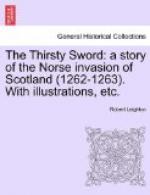The abbey with its chapel was a small building in the Norman style, inclosed by a high wall, and standing in a grove of birch and ash trees. In the crypt of the chapel and within the cottages the women of Bute, some hundreds in number, had made their retreat, and the Lady Adela of Rothesay had a most anxious four days attending to her numerous charges. Food there was in plenty, of a simple sort, and the wells within the abbey buildings provided abundance of pure water.
In the underground passage connecting the crypt with the walled inclosure of the Circle of Penance the children had been collected. Ailsa Redmain was with them, attending to their many wants, helped by some of the women.
All this had been Kenric’s doing, and to him would be due the praise and the thanks of the people of Bute if his plan of defence should succeed. But Kenric was not at his ease, for he knew that should the Norsemen set aside thoughts of the sanctity of the place and make a successful descent upon the abbey, then surely the women and children would be discovered and an appalling massacre might follow. Little cared he for the loss of his castle and lands; little thought he of the value of his own young life. His one purpose was to make a strong defence and to save his people, for whose sakes there was nothing he would not dare to do.
And now his most earnest wish was to know whether the enemy would make their attack by sea or by land. He was equally prepared for either course.
It was wearing towards sundown, and yet there were no signs. The castle of Rothesay had been taken before noon. Where now were the enemy?
At last Elspeth Blackfell came to Kenric, who stood with the abbot within the thick walls of the inclosure.
“My lord,” said she, “I hear the tread of many feet. It is by land they come. Oh, that I knew where my sweet Aasta hath gone, and if she be still in life!”
“Father,” said Kenric to the abbot, “will you now do as I propose?”
“What would you, my son?” asked the abbot.
“It is that you would now go without these walls and boldly face our enemies, holding before you the crucifix. If Roderic be their leader, it may be that the sight of you will move him to a sense of the holiness of this place, and haply you may by your arguments turn him aside from his purpose. Were I to show myself — though, indeed, I would willingly face that man and fight with him to the death — he would be moved to wrath, and, slaying me, he would not rest any the more in his designs.”
“I will adventure it, my son,” said the abbot solemnly.
“God be with you, holy father,” added Kenric, crossing himself.
“My lord,” said Elspeth, “think you that Godfrey Thurstan can have power to move Roderic in this wise? How was it when he bade this man go upon the pilgrimage of penance? Did Roderic then obey his holy words? Not so. But there is one whose words Roderic MacAlpin will indeed take to heart, and that is your servant Elspeth. Let me then go, my lord. Open the gates that I may go forth and face this outlaw and his followers. And if it be that he turn not back, then may the massacre of our children rest upon my head.




